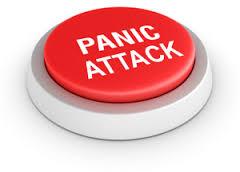News Taffy
| Post Your News Send Us An Event Start A Gallery |  |
| Most Recent | Most Popular | Top Contributors | Galleries | Events |
 | Contributor: admin subscribe to my stories |
 The Cardiologist's Wife - Tips on How to Handle Panic Attacks While watching TV last night, one of the main characters was a victim of a violent assault. Afterwards, he began having panic attacks when something reminded him of the attack or the assailant. It made me remember my husband mentioning seeing patients who were actually experiencing a panic attack and not a heart attack. A panic attack is very real. The symptoms can include a pounding heart or chest pain, shortness of breath, an intense feeling of dread, dizziness or feeling faint, sweating, nausea, chills or hot flashes, a choking sensation or smothered feeling. They are usually over in 20 to 30 minutes. Because heart attacks and panic attacks share many of the same symptoms, someone having a panic attack may initially seek help for a heart attack. Panic attacks can happen without warning for no apparent reason. People can experience just one but if they begin to occur frequently, they may have developed panic disorder. Panic disorder is characterized by repeated panic attacks that aren’t tied to a specific situation or event, constant worry over having another panic attack and a change in the usual pattern of behavior such as avoiding certain places or activities. Many people who have panic disorder are also agoraphobic and avoid going out in public. The exact cause of panic disorder is unknown but it does tend to run in families or may be caused by abnormalities in the brain in the areas that control the fight or flight response. Substance abuse of alcohol or drugs can also be an underlying cause. A major life event or great stress like the death of a loved one or a divorce can trigger panic attacks. If you experience a panic attack or have some of the symptoms, you should always see a doctor. He can rule out a possible heart attack or another medical condition with similar symptoms like hypoglycemia (low blood sugar) or medication withdrawal. You should also seek help for panic disorder as it is very treatable and you can go on to lead a perfectly normal life. Unfortunately, many people with panic disorder do not get help because they are embarrassed and their lives can be severely limited as a result. A combination of therapies like counseling, relaxation techniques and medications such as anti-depressants are usually successful. Cognitive behavioral therapy in which a person learns to recognize and change thought patterns and behaviors that may lead to a panic attack are useful for some. If you are around someone having a panic attack, you can help by remaining calm, speaking in short, simple sentences and taking them to a quiet place. Try to help them to get control of their breathing by slowly counting to 10. Offer their anxiety medication if they usually take it for panic attacks. Acknowledge that their feelings are real but gently remind them that they are safe and that they can get through this. Ask them what they need, don’t assume anything. Never brush it off as a figment of imagination and don’t assume the patient is pretending or “putting on”. Encourage your loved one to get help if they haven’t already seen a physician. [+] add comment |














